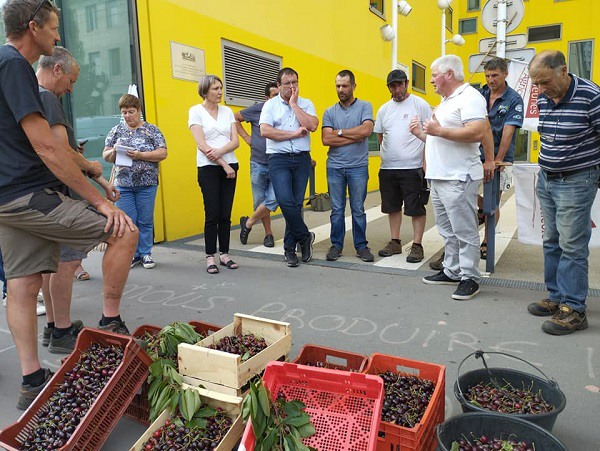On the 29th of June, at the request of FDSEA, cherry growers of the Loire department demonstrated in Saint-Etienne to denounce the increasing pressure of drosophila suzukii (the Asian midge) in their orchards and the lack of resources. Faced with the gradual disappearance of active solutions and current weather conditions that favor the progression of this insect, producers are at a loss.
 Drosophila suzukii arrived in France over a decade ago, and it now attacks other fruit as well: plums, strawberries, grapes... / © FDSEA Loire
Drosophila suzukii arrived in France over a decade ago, and it now attacks other fruit as well: plums, strawberries, grapes... / © FDSEA Loire
With the banning of dimethoate in 2016 and phosmet in 2022, fruit growers find themselves unable to combat the insect. The existing alternatives are considered expensive or ineffective.
For Anthony Oboussier, producer in the Drôme region, cherries represent a small proportion of his stone fruit harvest. His solution has been to keep the earlier varieties, which are less prone to this pressure. “I have removed a lot of cherry trees in recent years to keep only the early varieties, so I have managed to avoid the insect, which arrives later in the season. But for the producers for whom cherries are the main crop, the losses range from 50 to 100%, especially for those whose harvest is currently in full swing. There is little hope of reauthorizing solutions such as phosmet, so we need to find solutions to combat this problem and help growers through compensation.”
The French cherry sector even fears a loss of over 50% of production potential in the coming years. For this reason, it is asking the French public authorities for effective technical solutions, as well as exceptional financial aid for the losses incurred during this campaign.
More than 20 French deputies have taken up the issue, writing a letter to the French Minister of Agriculture, Marc Fesneau, at the end of June. “Today, producers in the southeast of France are increasingly concerned. Despite all the trials carried out by growers, none of the authorized treatments - including the most natural ones - have been effective in protecting late cherries. Flights of drosophila suzukii are proliferating daily, more and more in line with the weather conditions that favor the insect's development. At the same time, the ineffectiveness of the treatments has led to the reappearance of attacks by the classic drosophila. There is an urgent need to compensate growers and to mobilize resources in order to speed up research and control measures.”
So far, no decision has been made by the French public authorities, but the French Ministry of Agriculture and Food Sovereignty issued a press release last week, stating that "the minister has fully grasped the urgency of the situation and the distress of producers, and has already mobilized his staff to assess and document the losses. The French cherry sector contributes to our food sovereignty and to the local economy of several French regions.
In line with its commitment to professional organizations, the French government will be working alongside producers to help them overcome this crisis, and we are currently examining the type of support it could provide. The Ministry's services are already working hard in the field, documenting the losses through its Regional Directorates for Agriculture and Forestry (DRAAF), which are monitoring the climate and health situation.”
